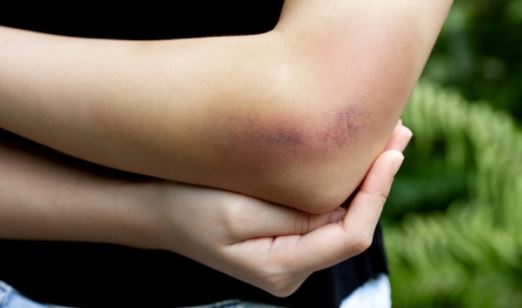Lifestyle
5 possible causes of easy & frequent bruising

Bruises are typically an outcome of a tissue injury, which leads to discolouration of the skin.
It forms when there is bleeding under the skin following an injury and causes damage to the blood vessels.
The colour of the bruise can range from black and blue to brownish or purple and one may experience a mild pain when the injured area is pressed.
People get bruises for different reasons. Some are caused, while others appear on their own. As opposed to younger individuals, older people are more prone to bruises.
However, the most important thing to take note of are the possible causes behind why anybody bruises. It could either be due to a health condition or some medications. Read on to find out.
1. Bleeding disorders
One of the common causes of bruising are bleeding disorders. These are a group of conditions that occur when a person’s blood does not clot at all or does so very slowly. Bleeding disorders like hemophilia or von Willebrand disease are some of the most prevalent causes of bruising. Such diseases have a defective or an absent protein vital for blood clotting.
2, Cancer
Not all, but certain cancers associated with the blood or bone marrow, known as Leukemia, may lead to bruising. Those with leukemia are likely to bruise because their bodies do not produce enough platelets to stop bleeding blood vessels. The bruises from leukemia are however no different from the bruises caused by any other reason. But they may show up at unusual areas of the body.
3. Excess alcohol consumption or liver disease
Excess alcohol intake can lead to liver problems such as cirrhosis. When liver diseases progress and become more complex, it limits the production of the protein from the liver that is crucial for blood clotting. This may lead to excessive bleeding, cause frequent and easy bruising.
4. Vitamin C or Vitamin K deficiency
Vitamin C deficiency can lead to health conditions such as scurvy. This further results in painful bleeding gums, unexplained wounds and easy bruising. Additionally, Vitamin K, which is an important nutrient that helps form blood clots and stops bleeding, is crucial for preventing any instances of bruising. Lack of Vitamin K can cause sudden increase in bruise marks on the body.
5. Blood thinning medications
Blood thinners like aspirin can prevent blood clots, making a person bleed more and causing bruises. Until and unless extremely necessary and prescribed by the doctor, avoid taking blood thinning medications. They can weaken and change the course of blood vessels, leading to inflammation and increasing the risk of bleeding and bruising.









